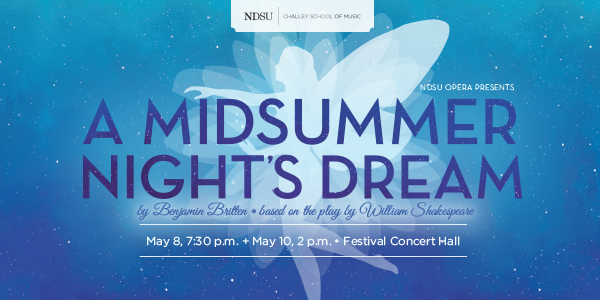Writing the Opera
In August 1959, Britten decided to compose a full-evening opera for the reopening of the refurbished Jubilee Hall in Aldeburgh in June 1960. As this left no time for a libretto to be prepared anew, he chose to adapt with Peter Pears Shakespeare’s A Midsummer Night’s Dream, though as he admitted at the time, he had always admired the original play and was excited by the various levels of action between the different groups of characters. As with The Turn of the Screw, these groups are characterised by strongly differentiated colours: the bright, percussive sounds of harps, keyboards and percussion for the fairy world, warm strings and wind for the the pairs of lovers, and lower woodwind and brass for the mechanicals. The opera is completely faithful to the spirit of the original and must be counted as one of the most successful operatic adaptations of a Shakespeare play. It is possibly the most beguiling and enchanting of all Britten's operas, a work with a spellbinding atmosphere that inhabits a truly unique dreamlike world.
Synopsis from Boosey & Hawkes
About the Story
A Midsummer Night's Dream deals with the universal theme of love and its complications: lust, disappointment, confusion, marriage. The plot focuses on three parallel stories: the trials and experiences of two sets of lovers camping in a magical forest, the world of the Fairy King and Queen and their elves, and a group of rough craftsmen attempting to stage a production of Pyramus and Thisby for the wedding of the Duke of Athens.
Hermia is in love with Lysander, but her father wants her to marry Demetrius. To escape the arranged marriage, she and Lysander elope into the woods. Demetrius follows them, and he is pursued by Helena, who nurses an unrequited passion for him. A love quadrangle develops among the young lovers when mischievous Puck plays Cupid. "The course of true love never did run smooth" says Lysander. Meanwhile, a group of amateur actors rehearses a badly-written play in the woods, and soon all find their lives changed by the doings of Oberon and Titania, the warring king and queen of the fairies. Magic, action, love and humor are the ingredients for this unforgettable spell.
This work is widely performed around the world, and no wonder - it's about the world's most popular pastime, falling in love. But as Puck knows, falling in love can make fools of us all. Love is crazy, love is mad. Will love win out in the end?
Guest Director: Tara Faircloth
Stage director Tara Faircloth’s work has been seen in opera houses around the nation. Critics hailed her “incisive, tightly meshed direction” (Opera News) for The Rake's Progress at Wolf Trap Opera, calling it “a simple and elegant production” (The Washington Post). She has directed two world premieres with the Houston Grand Opera's East+West series (Her Name Means The Sea and The Bricklayer) and has a thriving career in regional houses such as Wolf Trap Opera, Utah Opera, Arizona Opera, Tulsa Opera and Opera Colorado (Il Barbiere di Siviglia, Rigoletto, Die Zauberflöte, Hänsel & Gretel, etc.). The baroque repertoire is of special interest to Ms. Faircloth, who made her directorial debut with Ars Lyrica Houston’s production of Cain: Il primo omicidio in 2003, and has since designed and directed a number of shows for the company, including Charpentier’s Actéon and La Descente d’Orphéeaux Enfers. She has created productions of Dido & Aeneas for Ars Lyrica at the Festival di Musica Barroca in San Miguel de Allende, Mexico, and for Mercury Baroque in collaboration with the Dominic Walsh Dance Theater.
This season, Ms. Faircloth has two exciting company debuts: Le Nozze di Figaro with Atlanta Opera, and Fidelio at Madison Opera. In addition, she returns to Wolf Trap Opera for a new production of Carmen, Rice University for a new production of Il Ritorno d'Ulisse and Arizona Opera, where she will be directing her first Eugene Onegin on a new set designed with her frequent collaborator, Laura Fine Hawkes.
Ms. Faircloth has worked extensively on directing staff with such companies as Lyric Opera of Chicago, Houston Grand Opera, Central City Opera, and Dallas Opera, and as such, has worked on some of the most complicated operas in the repertoire, assisting international directors and preparing cover casts of some of the best performers in our industry. She is increasingly sought out for her skills as an adapter and has created such pieces as the “Mini” Grapes of Wrath, One Enchanted Evening (an operetta pastiche), and the “Mini” Magic Flute, commissions of Opera in the Ozarks and Utah Symphony & Opera. She has a private coaching studio in Houston, Texas, and regularly works with the talented singers in the Houston Grand Opera Studio and Rice University.


